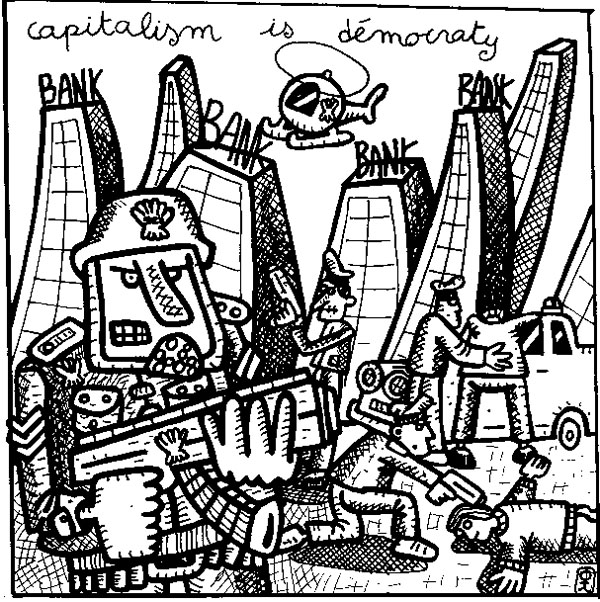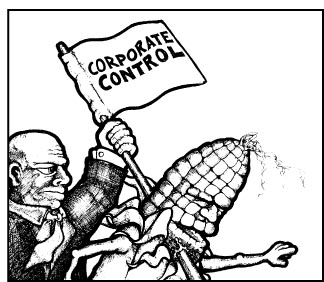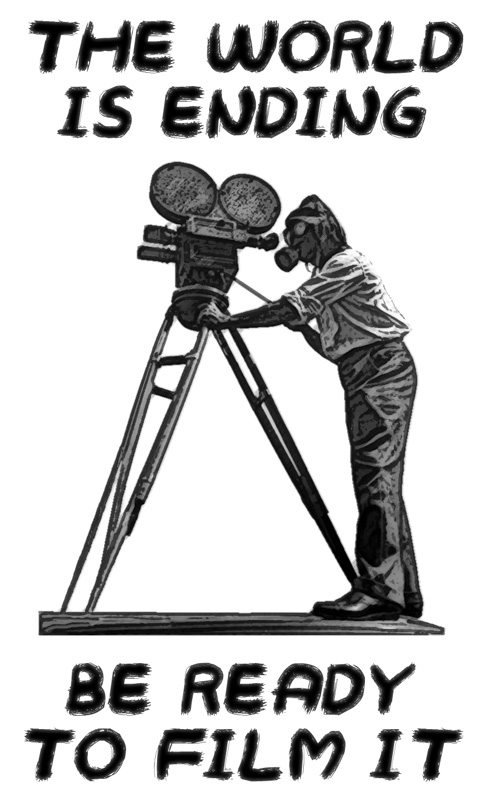|
|||||||||||||
|
Coercion in the Form of Economic Domination
Does Cheating the Worker A Debate Between Punkerslut
Libertarian International (LI) Homepage
Greetings, There are several interesting things that I'd like to comment on in your "Mission" statement. You defend "the non-aggression principle: no individual or group of individuals shall initiate force against the person or property of any other individual." What is curious is the justification that comes directly after this: "After all, your parents probably taught you not to cheat, steal or pick fights -- in other words, not to use force against others." Well, clearly, to cheat someone means, explicitly, not to use force against them in a way that deceives them, and leaves them worse off. Stealing can be done without aggression. It should be noted, that even though your "Non-Aggression Principle" equates property with life, the word "aggression" means something directed at a person -- not an object. Or, as Wikipedia's first line says for the entry Aggression: "...behavior between members of the same species that is intended to cause pain or harm." Stealing can cause harm, just like cheating, but neither of these things necessarily involve "the use of force against others." What do you imagine a parent to think of "cheating" when tell their child not to cheat? Most likely, they probably mean not to make deals with other children in a way that deceives them. As a child, this would mean not trading snacks with someone when you knew that yours was past the expiration date. And, as an adult, that probably translates just as well to many other things, like not paying with counterfeit money. But in all of these things, there isn't force. The "non-aggression" principle doesn't apply. A parent might be ashamed of their child, if they told them not to cheat, and the first thing they did was run a whitewash scam the likes of Tom Sawyer. But when that child grows up, runs a company, and carelessly dumps toxins into the ocean, you write, "First of all, 'the planet' is not in danger..." What happened to not cheating people? Everyone breathes this air, everyone feels this sunshine, and everyone feels the impacts upon the Earth. Why doesn't "cheating" come into play when it's the entire population that's been cheated, and just one or two Capitalists who did the cheating? Whether or not you believe in Global Warming is irrelevant. You'd have to cease believing in Physics, Biology, and Mathematics to believe that a toxic, chemical spill doesn't effect the lives of every living organism on the planet. And, of course, "secondly, crippling our economies physically, and our children mentally, are not pathways to robust societies ready to tackle whatever challenges the future may bring them, environmental and otherwise." So, the cheating and stealing done by the rich doesn't matter, because if we were consistent about our philosophy, our economy would go under? A curious justification. As one writer puts it on your site, "Capitalism is up front about placing responsibility on free men and women..." which naturally contradicts "The only time physical force is acceptable is when it is used to defend against force." The first concept of property practiced by all men and women was the collective ownership of the planet. Capitalism could never establish itself except by stealing the hereditary rights of every human being when it made any private plot of land. Naturally, if we have a right to defend our property by force, then we have a right to violently overthrow Capitalism, as there is no Capitalist whose money does not funnel through the sweatshops and forced labor camps of South America, Africa, and Asia. (Or, dare I even say the United States?) It's not just a mild contradiction. Show me one dictatorship, one monarchy, or even one nation, where the power of a few Capitalists wasn't established by government, or by violent force. You'll certainly be hard-pressed to find anything. You even attack Socialists saying that they believe "As an economic principle, monopoly is more efficient than competition." And yet, you adhere to a system where 1% of the population owns 70% of the land, without even the mildest thought of critical examination going through your mind. (Progress.org) I can imagine your description of monopoly as "When a few guys get together to possess all of a certain resource so as to exclude others." Yes, I can see the logic in applying this to government, no doubt. But, when you fail to apply it to Capitalism altogether, I begin to doubt very, very much. The statesman threatens you with prison, the capitalist with starvation -- they are both your masters, and they both use monopoly and domination to control you. The contradiction should be quite obvious: the state lifts up its arms in aggression, tightly gripping the blade between its hands, and then finally swings it down upon you, but you dodge at the last moment. And, to take comfort in preserving yourself, you decide to go to the person who gave the blade to the state, and to ask for sanctuary. Is there not some enormously miserable contradiction in all this when you support Capitalists in maintaining what they gained by armed aggression, but you oppose the state in "armed aggression" in general? After all -- Libertarianism means "Anarchist-Communism." (Source: Google/Wikipedia.) It's quite curious that you would take the slogans of a Leftist, anti-government movement, and then just throw away the philosophy that it describes. Thank you for reading this far. I patiently await a response. Sincerely,
Greetings, Andy Many thanks for your comments. They are well thought out. I would like to draw your attention to a few points you raise (below in blue, with my replies in black)
Cheating leaves a person worse off; it is generally the cheater's intent. Stealing an object affects the owner, and therefore is an aggression against that person. It may be more or less serious, that's what judges need to establish in order to assess the compensation the thief owes the victim, but the aggression always exists. Paying with counterfeit money, or with defective goods in barter, as per your examples, is therefore an aggression, as the victim ends up with a lower value than she expected and was entitled to; the cheat has stolen from her that excess value. 2 I disagree with the opinion on the LI website that our planet is not in danger. Also I am not a utilitarian, and therefore I don't believe that global economic prosperity justifies trampling on any individual's rights. The best defence of the planet, however, is individual property. Nobody dumps garbage in my garden, or kills my neighbour's cows, because we could seek redress. Companies are happy to dump chemicals into the sea, on the other hand, because the sea doesn't belong to anyone (tragedy of the commons?). Or pollute rivers, because governments are concerned about the jobs and taxes that would be lost if they didn't. As you rightly mention toxic spills damage objects: land, rivers, plants, the sea. But this damage to things quickly affects human beings. We are not spirits detached from the material world. An aggression can be as much against our bodies than against the objects we make with our bodies and on which we depend for our wellbeing.
You won't convince me that the first human tribes in Ethiopia, or wherever they were, could claim rights over a planet they had no notion of. Or that hunters in Africa had rights over the hunting grounds of their contemporaries in China, and vice versa – no more than I can claim some right on the moon, or an undiscovered planet. Human beings create a bond between themselves and elements of nature by occupation, work, trade, gift, in other words by some concrete action they undertake. Now it is true that objects that exist today, notably land, have not come into the hands of their present owners without some violence and dispossession along the way. It is the original sin of property. But no one is absolved. A commune would be farming some fertile land, and the members would collectively enjoy the fruits, when there may well be people on another continent, in a less privileged occupation presently, but whose ancestors were owning the commune's land, unbeknownst to all of them. I believe the people who have been dispossessed have a right to claim their property back. Their direct heirs may too, if they can establish that it was the deceased's intent to bequest them that property, had it not been stolen. After that it is impossible to know whether the successive presumed owners would not have disposed of the asset, gambled it away, or lost it. 4. Anarcho-capitalists and anarchists-communists are part of the same ‘anti government movement' you refer to. The difference between them is that anar/communists cannot establish an objective difference between what is allowed and what is not allowed in society. A rather important issue, I would think. Anar/capitalists know that difference. It is called individual property rights. Best wishes
Greetings, Christian
Of course, I wholeheartedly agree with you on this point. There was no force, no violence against a person, but in the end, one human being was left worse off. So, how is this different from Capitalism, where the wages I receive are worth less than the market value of my labors? It certainly seems like a cheat to me. Any arguments you can make on behalf of it, such as the "voluntary" nature of the agreement, doesn't change the fact that the people are worse off because of it. And, if you don't think they're worse off because of exploitation, you could probably make a case for selling contaminated food: "At least they have some food and they're not starving. They should be thankful for that." But, Anarcho-Capitalists, or Libertarian-minded Capitalists, make the exact same argument on behalf of wages. If the Non-Aggression Principle truly excludes cheating and manipulation, then it must exclude Capitalism.
And who is going to own the atmosphere? And the sky? And the nutrient-chemical composition of the soils, the insects and animals that respect no property rights, and, as you mentioned, the oceans and seas? The problem with owning the seas, is that if you dump something into one ocean, it ends up in all of them. This is why industrialists dump toxins and chemicals onto their own property: a stream nearby helps deliver it far, far away. This is why every stream and river in New England is polluted, containing numerous warning signs about the dangers of touching the water. How could individual property rights ever fix this problem of the oceans? If you dump mercury into the Bay of Bengal, you'll find it washing up on the beaches of California. Saying someone owns the Mediterranean Sea is like someone owns the air mass over North America. Take the only alternative in terms of private property: one persons owns all of the atmosphere, and another person owns all of the oceans. Does that really sound like a nice planet to live on?
Of course, like workers who built up mines, factories, and farms, and afterward, need them for wages and productivity just to live. Why would aggression come to mind when you think about legal restrictions on capital, but it doesn't surface when looking at the vast majority of the people -- a working class?
When Rene Descartes was informed of the tribes in Ethiopia, and how they spoke, his reaction was, "Those sounds you hear are no more than the grunts you hear in beasts, and they are not even capable of consciousness." It would be quite a Euro-centric view to propose the same, except in regards to understanding social institutions, to those in Africa, South America, and Asia. According to "The Economics of Underdeveloped Nations," edited by J.M. Keynes and Milton Friedman, "...wide personal obligations act as a form of insurance in societies in which most people live at a very low level of income and have little or no reserves.... The extended family system serves as an insurance fund, as an informal poor law, as a means for pooling and circulating capital within a group, and also as an outlet for charity and generosity." (Page 65.) Similar types of communal associations, in terms of sharing land and equal rights to land, can be found in aborigines of Southeast Asia. ("Property, Kin, and Community on Truk," by Ward H. Goodenough.) But you don't have to go to Africa to know this much about property rights. As Locke said in Second Treatise, "As much as any one can make use of to any advantage of life before it spoils, so much he may by his labour fix a property in. Whatever is beyond this is more than his share, and belongs to others." (Chapter 5) This is an examination of property rights that assumes we are at the very start of civilization. We only believe in property today, he argued, because of how we believed in property thousands of years ago: we separated it from the commons by our labor, in a way that doesn't deprive others of the same opportunity. If you accumulate property today, like a Capitalist who exploits the worker, then you are violating these property rights, since possession by one means the dispossession of everyone else. Nor can you argue that living conditions have improved because of the Industrial Revolution. In 1600, a farmer worked 10 hours a day, and live to maybe 50. In 1850, it was 16 hours a day, and they were lucky to reach 30. It's quite clear that the industrial revolution, or the isolation of productive capacity into the hands of the few, is responsible for this particular economic effect.
Yes, by being a commune, it would have to accept all that came to it. The fact that people far away are oppressed by some government or Capitalist has nothing to do with people here and now fighting the system of exclusion. Why even oppose dictatorship or tyranny? We could always say, "But, we must be allowed to do it, too, because they do it far away elsewhere. If we had justice, it would just be for us, and not everybody, so to hell with justice."
Yes, Capitalism plays that game. That's why Anarchist-Communists burn the records of the property registrar wherever they organize a revolution. We may as well argue, "We don't know who owns what. So, now all is equally owned. Just call it Anarcho-Capitalism if that's the only way you can be happy with it."
That's funny -- considering that Anarchist-Communists have organized several areas where state and capitalism were abolished. There was no lack of order in the St. Petersburg Syndicates, the Free Territory of the Makhnovitsi, the Anarchists of Catalonia in Spain, or the Paris Commune in France. And, yet, Anarcho-Capitalists cannot claim one measly square foot on this planet where their revolution reorganized society. Anarchist-Communists have established independent, free societies, without capitalism or state, and these organizations have worked tremendously well. While Liberals in France fell to Hitler in three weeks, the Anarchist-Communists of Spain held off Hitler, Mussolini, and Franco for three years. On the other hand, Anarcho-Capitalists, far from establishing what "is allowed and is not allowed in society," have yet to even establish their own society. Isn't "objective" science supposed to be evidence-based? Anarchist-Communists "cannot establish an objective difference between what is allowed and what is not allowed in society." I have no doubt that what you meant to say is "objective to me," in which case, you really mean the OPPOSITE of objective: "subjective." There is nothing within Anarchist-Communist literature, after my heavy research, that would indicate that they have no idea "what is allowed and what is not allowed." If you read "The Conquest of Bread," by Kropotkin, more than a century old, I'm sure you wouldn't have that difficulty anymore.
Wait, the question was "What is and what is not allowed in society." Your answer is: "Individual property rights!" That's not a helpful answer. Sincerely,
|







